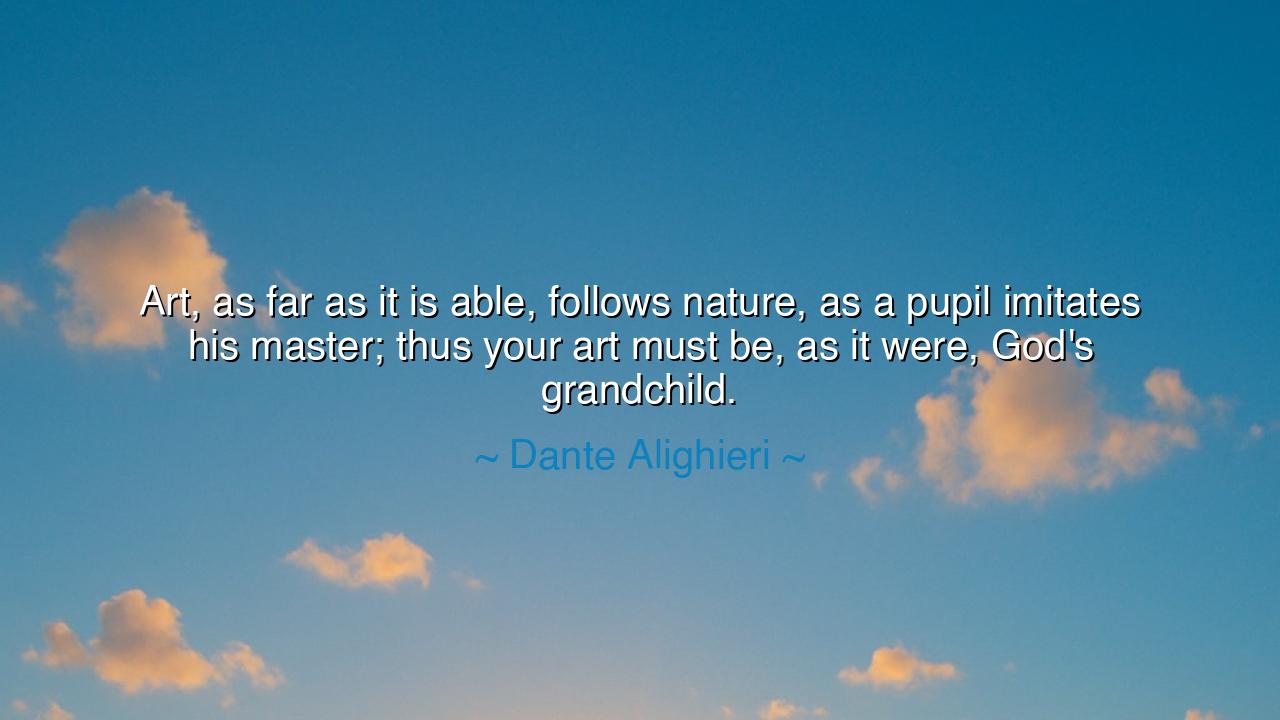
Art, as far as it is able, follows nature, as a pupil imitates
Art, as far as it is able, follows nature, as a pupil imitates his master; thus your art must be, as it were, God's grandchild.






Dante Alighieri, poet of eternity and pilgrim of the Divine Comedy, once wrote: “Art, as far as it is able, follows nature, as a pupil imitates his master; thus your art must be, as it were, God’s grandchild.” In this saying, he does not merely speak of painting, music, or poetry, but of the sacred kinship between creation and the Creator, between the works of man and the eternal hand that fashioned the universe. For Dante knew that all beauty, all truth, and all form begin first in nature, which itself flows from the infinite well of God. Thus, when man creates, he does not rival heaven, but honors it—he becomes an imitator of the divine, a humble child of nature, and therefore a grandchild of God.
The origin of this teaching lies in Dante’s deep reverence for both philosophy and theology. As a student of Aristotle and Aquinas, he learned that nature is the expression of divine wisdom in material form, and that to study nature is to glimpse the mind of God. Therefore, all art that seeks truth must first imitate nature: the curve of a river, the harmony of stars, the justice of balance, the rhythm of the human heart. Just as the pupil sits at the feet of the master, so too the artist must sit at the feet of creation. Only then does his work rise above vanity and enter the realm of the eternal.
History bears witness to this truth. Consider Michelangelo, who, centuries after Dante, gazed upon blocks of marble and said that he saw angels imprisoned within them. His task, he believed, was not to invent but to reveal, to free what nature and God had already placed there. The Sistine Chapel, with its vault of painted heavens, is not Michelangelo defying God, but Michelangelo becoming, in Dante’s words, God’s grandchild—echoing the divine act of creation through the brush of a mortal hand.
The meaning is profound: art is not rebellion, but reverence. When it is true, it does not strive to dominate or distort, but to uncover the eternal patterns already woven into the fabric of existence. The artist, therefore, must approach his work with humility, not arrogance. He is not a god, but a child of God, born through the womb of nature. His task is not to invent ex nihilo, but to mirror the beauty, harmony, and truth that the Creator has already spoken into being.
This is also a teaching about the dignity of human labor. For it declares that our works—whether in art, craft, or daily toil—gain nobility when they align with nature’s order. The farmer planting seed in season, the architect aligning stone with sun, the musician tuning strings to harmony—all partake in this divine lineage. Their art, however humble, becomes an echo of the eternal, and thus a grandchild of God.
The lesson for us is clear: if you would create, look first to nature. Study its forms, its rhythms, its laws. Let the bird’s wing teach you grace, the mountain teach you strength, the river teach you persistence. Then let your hand shape clay, write words, or weave melodies that honor what you have seen. In doing so, you will not only imitate nature but also reverence the Source beyond nature.
Practically, this means cultivating humility and observation. Walk outside daily, not as a passerby, but as a pupil in a sacred classroom. Notice the proportion of a leaf, the arc of the horizon, the silence between the stars. Let these teach you the laws of balance, order, and beauty. Then return to your craft—whether it be painting, writing, teaching, or building—and shape your work in harmony with those eternal principles.
Thus, Dante’s words remain not as relic, but as commandment: let your art be God’s grandchild. Let it spring not from pride, but from reverence; not from chaos, but from order; not from rebellion, but from wonder. For when art honors nature, and nature reflects God, then your work too becomes part of the great chain of creation—an offering, a legacy, and a flame that will endure beyond the passing of your days.






AAdministratorAdministrator
Welcome, honored guests. Please leave a comment, we will respond soon